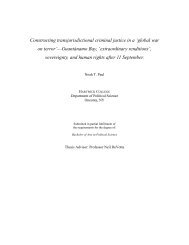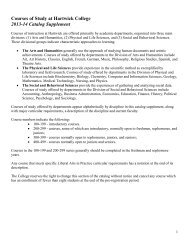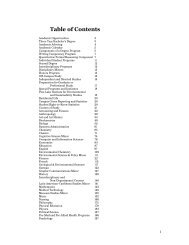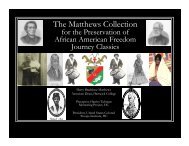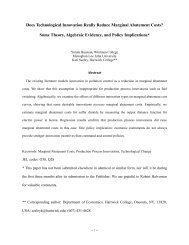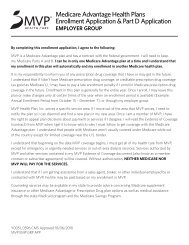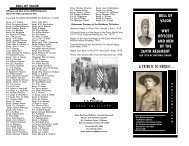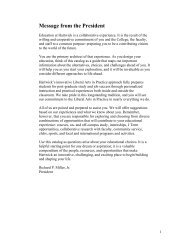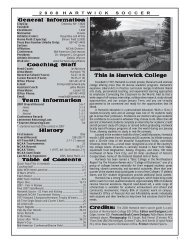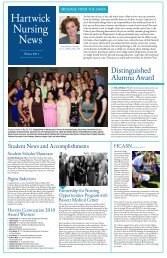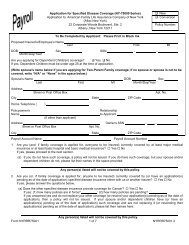Table of Contents - Hartwick College
Table of Contents - Hartwick College
Table of Contents - Hartwick College
You also want an ePaper? Increase the reach of your titles
YUMPU automatically turns print PDFs into web optimized ePapers that Google loves.
mental illness, crime, healthcare issues and discrimination. Throughout this<br />
course we examine the roles <strong>of</strong> social workers in addressing these social<br />
“problems.” In addition, this course <strong>of</strong>fers an introduction to case management,<br />
group work, community organization and social work administration. A field<br />
placement requirement is built into the course. Prerequisite: another sociology<br />
course. (SBA) 322 Population and Ecology (3 credits) A study <strong>of</strong> the social,<br />
cultural and environmental forces that affect population trends: the size, growth,<br />
composition, distribution, fertility, mortality and migration <strong>of</strong> human<br />
populations. Current historical and cross-cultural problems in population, food,<br />
health and environment will be explored. Prerequisite: another sociology course.<br />
(SBA)<br />
330 Language and Society (3 credits) This course involves the<br />
interdisciplinary study and analysis <strong>of</strong> discourse. It begins by looking at<br />
various theoretical and methodological approaches to the sociological<br />
study <strong>of</strong> talk. Specific topics include: language acquisition, language and<br />
social control, language in the classroom, race, class, gender, culture and<br />
language. Prerequisite: another sociology course. (SBA)<br />
331 Sociology <strong>of</strong> the Media (3 credits) The role <strong>of</strong> the media and its<br />
effect on democratic politics, culture, and public discourse in the U.S. and<br />
internationally. Prerequisite: another sociology course. (SBA)<br />
335 Global Studies (4 credits) Studies <strong>of</strong> selected areas such as Latin<br />
American, Ireland, and Mexico. An examination <strong>of</strong> the pre-colonial<br />
kinship, economic, political, and religious systems and related ecological<br />
and population patterns; the impact <strong>of</strong> European expansion upon them; the<br />
rise <strong>of</strong> independence movements; and contemporary political, economic,<br />
social, ecological, and population patterns all viewed in the perspective <strong>of</strong><br />
the world as a system <strong>of</strong> interdependent societies and states. Prerequisite:<br />
another sociology course. (NTW) or (SBA) (depending on course)<br />
340 Social Movements (4 credits) Throughout human history,<br />
subordinated groups <strong>of</strong> people have organized social movements to try to<br />
improve their lives and the societies in which they lived. Powerful groups<br />
and institutions generally have resisted these efforts in order to maintain<br />
their own privilege. Although inequalities <strong>of</strong> power and privilege and<br />
protest activity have always existed, some periods <strong>of</strong> history are more<br />
likely than others to spawn protest movements. The goal <strong>of</strong> this course is<br />
to orient students to the sociological analysis <strong>of</strong> social movements, with a<br />
special emphasis on transnational movements. Central questions for<br />
understanding social movements include: How do social and economic<br />
conditions shape the possibility <strong>of</strong> social protest? Why do people become<br />
involved in social movements? How are social movements organized?<br />
Why are some movements successful while others fail? How do<br />
movements decide which strategies and tactics to use? How has<br />
accelerated globalization <strong>of</strong> the international political economy forced<br />
nationally based movements to become transnational? Prerequisite:<br />
another sociology course. (NTW) (SBA)<br />
350 Topics in Sociology (3 or 4 credits) For description see Soci 150. Recent<br />
examples include, domestic violence seminar and social construction <strong>of</strong> the drug<br />
war.<br />
380 Labor and Society (3 credits) This course explores work in the<br />
context <strong>of</strong> sociological, cultural, historical and international forces.<br />
Specific topics include: gender-race-class systems and labor, paid/unpaid<br />
228



